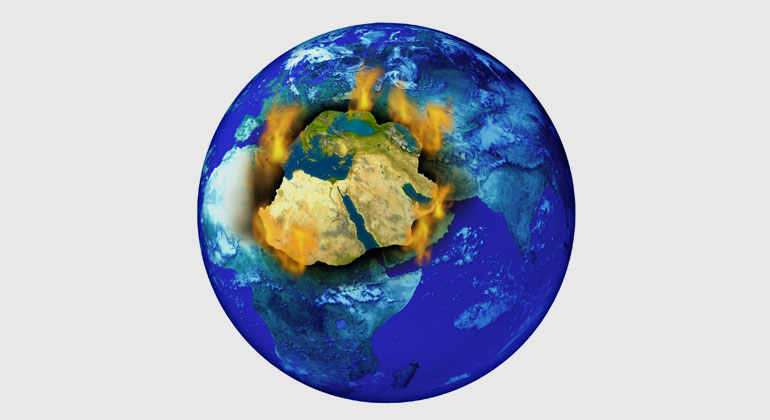Peace in the Middle East is possible
The dying of the Palestinians in the Gaza Strip has just begun. Israel does not want to be dissuaded from “crushing” the Hamas terrorists.
Very likely, in a war on such a small scale, there will also be many dead civilians among the 2.3 million Palestinians living in Gaza. And after that? Is there a plan for afterward?
So far, neither side is making a serious attempt to restart the peace process that began in Norway in the 1990s. Hamas, as the de facto government in Gaza, wants to “destroy” the state of Israel (“kill all Jews”) and the Israeli government wants to “smash” Hamas. In doing so, the Israeli government also accepts dead civilians as “collateral damage” and Hamas does the same by bombarding Israel with rockets on a daily basis. Realistically, an expansion of the war must be expected. Can and how will this vicious circle ever be broken?
At present, both sides are unconditionally following their leaders, who are incapable of peace because they are unwilling to it. There is hardly any sympathy for the suffering of the other side. Only the old dogma applies: an eye for an eye, a tooth for a tooth. We are the good guys and the “others” are the bad guys! But European history also teaches us that this way of thinking never leads to peace.
What could be the alternative?
There are always alternatives. The three monotheistic religions of the Middle East could play a central role in this. “Ethics is more important than religion” says the Dalai Lama. The central virtue of the three Abrahamic religions is compassion and reconciliation in the same way. There is a huge untapped potential for peace here. The common basis of Judaism, Christianity and Islam is: understanding instead of condemning, reconciling instead of destroying, loving instead of hating. Empathy is the path to peace.
Certainly still a vision at the moment. But why shouldn’t two states coexist peacefully in the Middle East in the future? Israel with a Palestinian minority alongside Palestine with a Jewish minority?
That would finally be a political balance between Israel and Palestine with the chance of prosperity for both sides. The two-state solution that has long been favored by many, including Germany. UN Secretary-General Guterres is right to point out that every war has a history.
But does it not mean a lack of solidarity with Israel if we try to classify and understand the acts of the terrorists? No, because understanding does not mean approving. If we no longer want to understand, we reach the end of humanity, we withdraw the ground for human coexistence and only violence and dictatorship remain. Compassion for Israelis and Palestinians are not mutually exclusive, they are conditional for everyone who wants to make a real contribution to peace. We are all human beings. The greatness of humanity is that people can change.
How did things go in Europe after 1945?
Economic cooperation was the basis for prosperity and political cooperation. That was the incentive for the foundation of the EU, in which no country has ever attacked another EU country militarily – in contrast to earlier centuries. So Palestine and Israel and their respective minorities could also cooperate economically and invite other Arab countries to a Middle East community, a Middle East Union – with the aim of creating peace and prosperity. In the process, a new economic miracle could be created in the Middle East, following the EU’s example and in cooperation with the EU.
At the beginning, of course, there would have to be confidence-building steps similar to those taken to overcome the Cold War a few decades ago in Europe and with the help of all Arab states. If the German chancellor is serious about saying that “Israel’s security is part of the German raison d’état,” then he must also seek to mediate in this spirit and no longer look the other way. And a distinction must be made between the far-right Netanyahu government and the will for peace of the majority of the Israeli population. The goal must be reconciliation and peace, monitored for a time by UN blue helmets.
The three Abrahamic religions could play a central role in this. It was also the Christian churches that played a central role in the peaceful German reunification as well as in the reconciliation between Germany and Poland. After all, all three religions in the Middle East are based on the values of love, peace and mercy.
Clever politicians and religious leaders in Saudi Arabia and Iran also hope for this vision. Thus, a growing Middle East peace could even become the key to world peace. Previous Middle East policy was and is too visionless. Above all, the importance of religions for peace in this region has been overlooked by the U.S. and the EU in all negotiations to date.
However, history after 1945 teaches us that even the point of deepest conflict can be the beginning of reconciliation in a new era. To claim otherwise is ideological and misanthropic. The land in the Middle East is large enough for a two-state solution. For this reason and “to keep channels of communication open”, Germany abstained from the recent vote on the new Middle East war in the UN for good reasons – as Annalena Baerbock explained her decision on ZDF television.
The country is big enough for both
Peace always begins with a dream of peace. Israelis and Palestinians can also recognize today that their “land is big enough for both”. Both should confess this before the United Nations and ask each other for forgiveness. The decisive factor will be whether one of them has the courage to take this first step. This first step in a new direction is peacemaking. The German-Polish reconciliation, which borders on a miracle, began when the Polish bishops wrote to their German brothers and sisters in 1965: “We forgive and we ask for forgiveness.”
Since 2006, there have been three wars between Israel and the Palestinians. The permanent occupation of the West Bank is not a solution. Why and for what a fourth and fifth war?
As a historian, I know that without a dream of peace, there is no peace. There will only be peace for Israel when there is also hope for the Palestinians. Anyone who does not believe in miracles is not a realist.
Source
Franz Alt 2023 | Translated with www.DeepL.com/Translator (free version)








